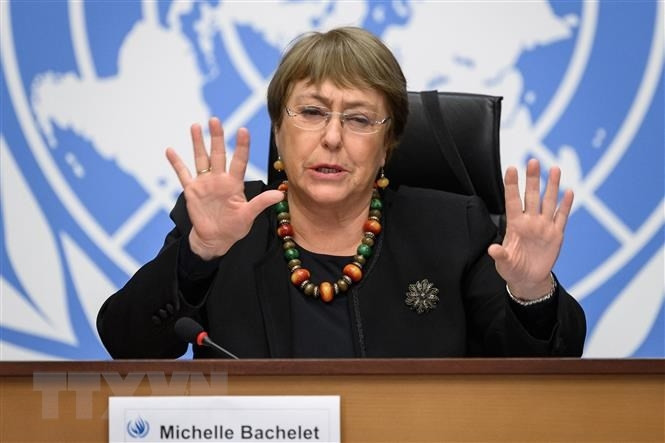The United Nations High Commissioner for Human Rights has described racism against Africans and people of African descent as continuing to deeply affect all aspects of life.

United Nations High Commissioner for Human Rights (OHCHR), Michelle Bachelet speaks at a press conference in Geneva, Switzerland
On July 12, United Nations High Commissioner for Human Rights Michelle Bachelet called on countries to do more to eliminate systemic racism against people of color around the world, urging them to openly acknowledge and make amends for past mistakes.
Presenting a report to the UN Human Rights Council, commissioned after the death of George Floyd by white police in the US last year, Ms Bachelet described how racism against Africans and people of African descent continues to deeply affect all areas of life.
In this report on systemic racism around the world, the UN High Commissioner for Human Rights also stressed the urgency of countries facing up to the legacies of the transatlantic slave trade and colonialism.
Ms Bachelet stressed that only by confronting past mistakes can countries hope to “transform the structures, institutions and behaviours that directly or indirectly contribute to racism.”
Ms Bachelet warned that systemic racism and race-based violence today stem from a lack of formal recognition by states of their responsibility for past governments' participation in or profiteering from the transatlantic African slave trade and colonialism.
Ms Bachelet called on countries to “create, strengthen and fully fund comprehensive processes” to share the truth about past practices of slavery and the harm it continues to cause.
Acknowledging the truth about these legacies and their impacts, as well as taking steps to address these harms through a range of remedial measures, will be key to “healing our societies” and ensuring that horrific crimes are severely punished, Ms Bachelet said.
The UN High Commissioner for Human Rights report cited 190 cases of Africans and Africans around the world killed in incidents involving law enforcement officers, who were “rarely held accountable” by the law.
Notable among these are the cases of the black American Floyd; the case of a 14-year-old African-Brazilian boy, shot dead during a police anti-drug operation in Sao Paulo in May 2020; and the case of a 24-year-old French-Malian man who died in police custody in July 2016.
In many cases, the data showed that the victims “did not pose a threat to life or cause serious injury.”
The report also said that in many countries in Europe and the Americas, people of African descent live in poverty and face serious barriers to accessing education, health care and employment, as well as political participation and other basic human rights.
The report outlines a four-point agenda for bold changes to ensure racial justice and equality, and calls on countries to implement it.
The report calls for immediate action to end what it describes as systemic violations of economic, social, cultural, civil and political rights. It also calls for countries to be realistic when it comes to addressing racial discrimination.
Second, the report also suggests that law enforcement officers who violate the law need to be severely punished, trust needs to be built, and supervision needs to be strengthened.
Third, government officials need to ensure that the voices and concerns of people of color and anti-racism activists are heard. This should include ensuring representation of people of color at all levels of government, including law enforcement, the judiciary, and policymaking.
Finally, countries need to confront the legacy of past racism, including through accountability and reparations.
The death of black man Floyd by white police officer Derek Chauvin plunged the United States into months of anti-racism riots in 2020.
Last April, Chauvin was officially found guilty by a US court on all three charges of second-degree murder, third-degree murder and manslaughter.
At the time, Ms Bachelet stressed that "the case has made it clearer than ever that there is still much work to be done to reverse the tide of systemic racism that pervades the lives of people of African descent".
According to VNA